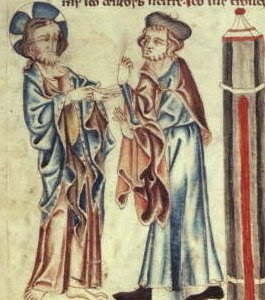
Emil Nolde, Dance around the Golden Calf, Staatsgalerie Moderner Kunst, Munich, 1910
Readings for Mass
First Reading: Exodus 32:7-14
Responsorial Psalm: Psalm 106:19-20, 21-22, 23
Gospel: John 5:31-47
And the Lord changed his mind about the disaster that he planned to bring on his people (NRSV, Ex 32:14).
Let us pray.
Father, as you at every moment call us, through the Word, to transcend ourselves to grow in your life, we, foolish ones, so often try to bring you down to our size. Because, when we are sinned against, we have a tendency to become angry with the transgressor, we assume, Lord, that you become angry also with us when we sin.
When Moses tarried on the Holy Mountain, the people below became impatient with him and forced Aaron to make for them a golden calf which they might worship. When Moses descended, so outraged was he at the spectacle of the idolatrous dance, that he smashed the tablets of stone. As to be expected, Moses’ anger was transferred to you, Lord, and even intensified. Moses great love for the people soon overcame his rage and then he turned (Oh, how very foolish we are!) to placate you, Father. The psalmist even says that Moses withstood you in the breach to turn away your destroying anger (As if Moses, or anyone, could stand against you, O Lord our God!).
How strange it is that, whenever we sin, we experience this great chasm that separates us from you, Father, but then, when we repent of our sin (And how could we possibly do that without your immediate aid?), there you are, without delay, present once more to us, any anger that we sensed coming from you abated.
Lord, the truth is (if only we could make it permanently ours) that even in sin you never leave us. It is we who reject the gift of your Holy Spirit dwelling in us but through your Word you remain ever present to us. Your Word is unfailing in challenging us to change our ways, to repent, to accept once again the indwelling of your Spirit. You, Lord, are Love and forgiveness. Any anger that we experience coming from you is our projection upon you. Since the anger is really of our making, it vanishes whenever we accept anew the gift of your Spirit and your life.
Father, through your Word, may we recognize that you are all-forgiving, in every situation, however grievous, and may we accept your forgiveness and the renewal of your Spirit and your life in us. Moreover, through your power given to us may we share that same forgiveness with all who have sinned against us.
Through Christ our Lord. Amen.
 Rembrandt van Rijn, Baptism of the Eunuch, Museum Catherijne Convent, Utrecht, 1626
Rembrandt van Rijn, Baptism of the Eunuch, Museum Catherijne Convent, Utrecht, 1626
































